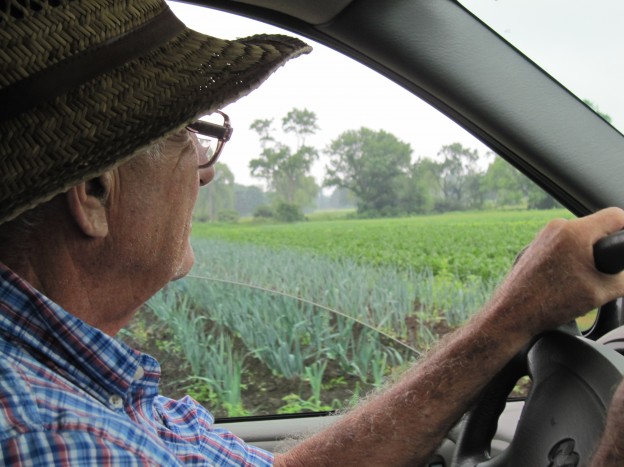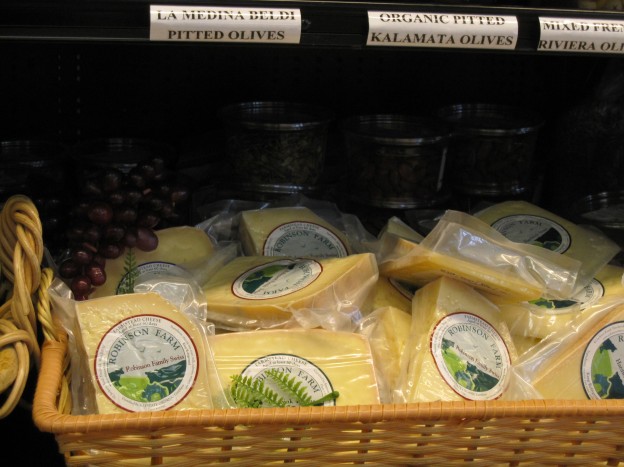Even—or perhaps especially—in a micro-region devoted to good food, such as Concord, the debate over what is best to eat continues.
Should we eat everything locally, choosing our baby greens from the farmer next door and embracing the grit? Or can we justify incorporating more worldly products into our diets? I’m thinking of the thick, fruity coffee from Costa Rica I love so much; the sprigs of saffron I brought back from Italy in a tiny glass jar; and, the strong cracked Spanish blue cheese I still seek out in New England. Shall we acknowledge that many Americans still do not know enough about food sourcing to realize their acts of consumption are choices, and that by eating deliberately–by realizing the implications of their meals–they impact others?
The two final food businesses in this series–Verrill Farm on the Concord/Sudbury line and Debra’s Natural Gourmet in downtown West Concord–enter this conversation simply through what they place on their shelves. Be it new June strawberries or Amazonian tea, both small-town businesses challenge us to question what it means to eat well.
9.) Verrill Farm, 11 Wheeler Rd., Concord

Steve Verrill of Verrill Farm (photo: Katie White/PRK)
Steve Verrill greeted me at the entrance of his sizable, well-stocked farm store wearing brown work-shorts, high socks and boots, a flannel shirt held up with suspenders, and a straw hat. He has skinny legs, sharp eyes and believes strongly in his work.
The Verrill family used to be dairy farmers. But in 1990 Steve, along with his wife and daughter, decided it would be more profitable to farm vegetables. The soil was well-fertilized after decades of sustaining cattle, and Steve began selling pick-your-own corn out of a tent on his family’s property. Since then, Verrill Farm has grown tremendously: today they employ 80 in the fields and farm store and, this season, planted 140 acres in Concord, Sudbury and Lincoln with roughly 100 crop varieties. They are one of the most prominent places to purchase local produce in the Boston area, supplying nearly forty restaurants.
I met head-on with two potentially controversial issues, neither of them new, during my visit: the first is Steve’s employment of 12 foreign farm workers. How many hours do they work? I wondered. Are they here by choice? Steve mentioned that the government is making it more difficult for him to hire foreign laborers, wanting him to employ jobless Americans instead. That made sense to me.
However, the trouble with the government’s model, as Steve explains it, is that Americans looking for a job aren’t usually interested in agriculture. They don’t care about his soil, aren’t in tune with the crops’ cycles of growth and decay, and they can’t recognize blights and pests. His Jamaican workers, in particular, are highly attuned to the nuances of Verrill Farm, having worked there seasonally for over a decade. Steve houses them on the property, and they work as much as they can–often fifteen or sixteen hour days–to make as much money as possible.
The second issue is the farm’s limited use of pesticides. Verrill Farm employs a system of Integrated Pest Management (IPM), in which farmers spray only when necessary, using the least toxic pesticides, herbicides and fungicides first, along with other, non-chemical methods for keeping crops healthy. Steve Verrill is reluctant to cut back because he feels such spraying helps ensure high-quality produce. (His assistant, Pete Lowy of Pete and Jen’s Backyard Birds, featured in Part Three of this series, holds a different opinion, believing one can spray less and still maintain healthy, viable crops. )
These questions of labor and crop management remained with me as I left Verrill’s. What I never doubted, however, was Steve’s and his family’s commitment to their land, to selling fresh produce and supporting other local food businesses. In their highly frequented farmstore, the Verrills give a platform to smaller food producers who may not have the chance to get their products noticed. To Die For Dips (featured in the Part Four of this series) actually began in Verrill’s kitchen!
10.) Debra’s Natural Gourmet, 98 Commonwealth Ave., West Concord

Olives and Cheeses at Debra's Natural Gourmet
Debra’s Natural Gourmet is a low-ceiling’ed, carefully organized trove of quality goods. It is a meeting ground for products from around the world–from Californian olive oils to British-brand teas. I followed the shop’s founder and current owner Debra Stark through this maze of global goods one afternoon, as she reorganized displays which, to me, were well-marked and meticulously placed. Debra built this business on her own, opening in 1989, and has seen a regular group of health-conscious and health-curious customers ever since. She’s exacting, that’s for sure, but her sharp eyes and unwavering philosophy have earned Debra’s Natural Gourmet national and regional respect (her business has been featured in Yankee Magazine and Cooking Light and, in 2009, Debra’s ranked 90th in the Women-Led Business Awards, hosted by The Commonwealth Institute and Boston Business Journal).
Debra grew up eating organically and using natural remedies. Her family converted to their holistic lifestyle when Debra’s aunt was diagnosed with cancer — before Debra was born. To combat the illness, Debra’s aunt and her extended family delved into natural foods and remedies; Debra’s mother traveled to Europe to study in a place where homeopathic medicine was more prevalent.
As a young girl, Debra remembers cases of organic produce arriving at her family’s house–wheatberries her mother would grind to make her own flours and breads. Debra never had inoculations, never went to a regular doctor. And she was always surprised by how little other people knew about what they put into their bodies–and how uncomfortable they were with taking care of themselves. “Even today, people are clueless about the effects of white sugar!” Debra explained to me. Instead of this refined sweetener, Debra uses coconut sugars in her store’s prepared foods.
Today, Debra works hard to educate her customers about how to live healthier lives. But for her, this doesn’t necessarily mean eating locally. “I buy as much local produce as I can,” Debra explained, “but I will not sell a local apple that has been sprayed or treated.”
Arguments for eating locally and organically intersect with issues of workers’ rights, gas prices and the environmental impacts of shipping food, and even community building. One argument for eating locally, despite potentially off-putting IPM systems, is that you get to know your farmers, and perhaps your neighbors, a little better. It’s a small sacrifice to pay for building real connections with other human beings, right? Or is it? How harmful can eating foods that are not organic be for us? If we take care of ourselves by eating healthfully and conscientiously, aren’t we then in a better position to forge healthy relationships with others?
There are no obvious answers, only important questions.
And Concord, MA, is a wonderful place to observe, and partake in, the paradoxes of eating well.
The Series:
Concord Food Tour, Part 4
Concord Food Tour, Part 3
Concord Food Tour, Part 2
Concord Food Tour, Part 1

This was a great series and I can’t wait to visit some of these places!
Wonderful series, as always. I agree that we as a nation are mostly removed from the source our food comes from, both locally and from within and outside the united states. The more we connect (through articles this one), as well as shopping locally, growing our own produce (if possible) and avoiding processed food, the better off we all are in terms of public health and supporting our local economy. Way to go (again) NPR!
Pingback: Thursday Tidbits: Chill By the Riverside | Public Radio Kitchen